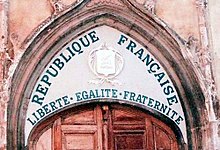 The 1905 French law on the Separation of the Churches and State (French: loi du 9 décembre 1905 concernant la séparation des Églises et de l'État) was passed by the Chamber of Deputies on 9 December 1905. Enacted during the Third Republic, it established state secularism in France. France was then governed by the Bloc des gauches (Left Coalition) led by Emile Combes. The law was based on three principles: the neutrality of the state, the freedom of religious exercise, and public powers related to the church. This law is seen as the backbone of the French principle of laïcité (secularism).
The 1905 French law on the Separation of the Churches and State (French: loi du 9 décembre 1905 concernant la séparation des Églises et de l'État) was passed by the Chamber of Deputies on 9 December 1905. Enacted during the Third Republic, it established state secularism in France. France was then governed by the Bloc des gauches (Left Coalition) led by Emile Combes. The law was based on three principles: the neutrality of the state, the freedom of religious exercise, and public powers related to the church. This law is seen as the backbone of the French principle of laïcité (secularism).History
Prior to the French Revolution of 1789, Roman Catholicism had been the state religion of France, and closely identified with the Ancien Régime.[1] However, the revolution led to various policy changes, including a brief separation of church and state in 1795,[2] ended by Napoleon's re-establishment of the Catholic Church as the state religion with the Concordat of 1801.[1] An important document in the evolution toward religious liberty was Article Ten of the 1789 Declaration of the Rights of Man and Citizen, stating that "No one may be disturbed on account of his opinions, even religious ones, as long as the manifestation of such opinions does not interfere with the established Law and Order."[3] The 1871 Paris Commune had proclaimed state secularism on 3 April 1871, but it had been cancelled following the Commune's defeat.[4][5]
After the 16 May 1877 crisis and the victory of the Republicans at the following elections, various draft laws requesting the suppression of the Concordat of 1801 were deposed, starting with the 31 July 1879 proposition of Charles Boysset.[6][7] Beginning in 1879, the French state began a gradual national secularization program starting with the removal of priests from the administrative committees of hospitals and boards of charity, and in 1880 with the substitution of lay women for nuns in hospitals.[8][9] Thereafter, the Third Republic established secular education with the Jules Ferry laws in 1881–1882, which were a significant part of the firm establishment of the Republican regime in France, with religious instruction in all schools forbidden.[6]
In 1886, another law ensured secularisation of the teaching staff of the National Education.[10][11]
Other moves towards secularism included:
- the introduction of divorce and a requirement that civil marriages be performed in a civil ceremony[12]
- legalizing work on Sundays[13][14]
- making seminarians subject to conscription[14][15]
- secularising schools and hospitals[8][12]
- abolishing the law ordaining public prayers at the beginning of each Parliamentary Session and of the assizes[14][16]
- ordering soldiers not to frequent Catholic clubs[17]
- removing the religious character from the judicial oath and religious symbols from courtrooms[18]
- forbidding the participation of the armed forces in religious processions[14]
The 1901 Law of Associations, which guaranteed freedom of association, also enabled the control of religious communities and, notably, limited their influence on education.[19] In 1903, while Emile Combes was minister, a commission was selected to draft a bill that would establish a comprehensive separation between the state and the churches.[14][20] Its president was the former Protestant pastor Ferdinand Buisson, and its minute writer, Aristide Briand.[21]
On 30 July 1904, the Chamber of Deputies voted to sever diplomatic relations with the Vatican[22] following the sanction, by the Holy See, of two French bishops (Albert-Léon-Marie Le Nordez and Pierre Joseph Geay) who had declared themselves Republicans and in favour of conciliation with the Republic.[23] The relationship was not reestablished until 1921, after the Senate accepted a proposition brought by Aristide Briand.[24]

No comments:
Post a Comment